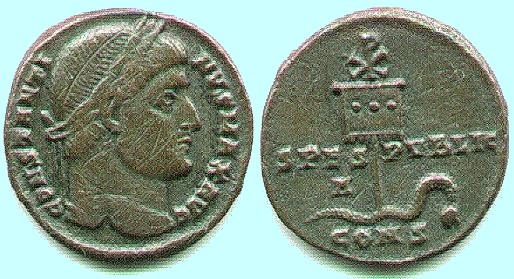Zosimus lived in the 5th century, Constantine in the late 3rd, so he was not there.
He was not writing from what he saw, he was writing from source documents at a time after the church was the established religion of the Empire, even being a pagan, he held a privileged postion at the court and he took his source from Dexippus:
Publius Herennius Dexippus, (b. c. 210—d. after 270), Roman historian and Athenian statesman, one of the principal authorities for the history of the mid-3rd century AD.(Encyclopedia Britannica).
PUBLIUS HERENNIUS DEXIPPUS (c. A.D. 210-273), Greek historian, statesman and general, was an hereditary priest of the Eleusinian family of the Kerykes, and held the offices of archon basileus and eponymus in Athens. When the Heruli overran Greece and captured Athens (269), Dexippus showed great personal courage and revived the spirit of patriotism among his degenerate fellow-countrymen. A statue was set up in his honour, the base of which, with an inscription recording his services, has been preserved (Corpus Inscrr. Atticarum, iii. No. 716). It is remarkable that the inscription is silent as to his military achievements. Photius (cod. 82) mentions three historical works by Dexippus, of which considerable fragments remain: (I) Ter, /1eT' 'AAE avSpov, an epitome of a similarly named work by Arrian; (2) /KVO KiL, a history of the wars of Rome with the Goths (or Scythians) in the 3rd century; (3) X povi iaropia, a chronological history from the earliest times to the emperor Claudius Gothicus (270), frequently referred to by the writers of the Augustan history. The work was continued by Eunapius of Sardis down to 404. Photius speaks very highly of the style of Dexippus, whom he places on a level with Thucydides, an opinion by no means confirmed by the fragments (C. W. Muller, F.H.G. iii. 666-687).
http://www.1911encyclopedia.org/Publius_Herennius_Dexippus
This says something, Zosimus, even though a pagan, takes his history from a priest. Of course his history is going to paint Constantine as a pious Christian.
That Zosimus was a pagan, and that the aristocracy was still around during Constantine's time, shows that Christianity hadn't become the sole religion of the Empire even after Theodosius made it official.
Michael Grant,( President and Vice-Chancellor, Queen's University of Belfast, Northern Ireland, 1959–66. Author of History of Rome and others; editor of Latin Literature and others), cited in
Encyclopedia Britannica, 2009 says that it was an assimilation that led to everyone adopting the new religion. Why should Constantine have been any different?
Evidence for this? He wasn't baptised until he was on his deathbed. Surely, as emperor and certainly if he was the devout Christian, wholely converted, he would have been baptised immediately, but not so:
Delaying baptism until just before death was a common practice in Constantine's time. This was based on the common view that after baptism, major sins cannot be forgiven and minor sins require penance for forgiveness. Better, then, to delay baptism that washes away all sins as long as possible. Some bishops frowned upon it and preached against it (which is how we know it was common practice) because of the obvious result: if people knew they could wipe away all their sins on their deathbed, why bother trying not to sin until then? As emperor and soldier who had to do many "non-Christian" things, Constantine would have felt that being baptized right after his conversion would certainly cost him salvation - for any sins (like killing) committed after baptism would be unforgivable.
http://www.religionfacts.com/da_vinci_code/constantine.htm
Mention da Vinci code and I'm sure you'll see red, TIm. This one is about what's wrong with the book.
The point is that we simply don't know do we? We can say "yes, he was wholly converted," or "no, he wasn't," or it was a slow process. I'm inclined to go with the slow process: that he saw the benefits of being a Christian, and accepted the religion, but still hung onto some pagan beliefs. Over time he leaned more and more towards Christianity, but continued to collect wealth and political power, and eventually when he was old and dying, went through the process of baptism.
A mind without instruction can no more bear fruit than can a field, however fertile, without cultivation. - Marcus Tullius Cicero (106 BCE - 43 BCE)




